Unity Catalog (UC) managed tables mix robust governance with seamless interoperability throughout instruments. For the reason that knowledge sits within the customer-owned cloud storage, organizations retain full management over its bodily location, whereas benefiting from Databricks’ built-in intelligence and automation.
In the present day, UC managed tables are essentially the most generally used desk kind in Databricks; two out of each three UC tables are managed. This adoption displays its potential to simplify operations, scale back prices, and enhance efficiency at scale.
With UC managed tables, organizations could be assured they’re all the time utilizing the most recent desk options. These tables are robotically upgraded, and in contrast to different desk sorts, they perceive utilization patterns, permitting new capabilities to be enabled safely and incrementally, with out guide intervention.
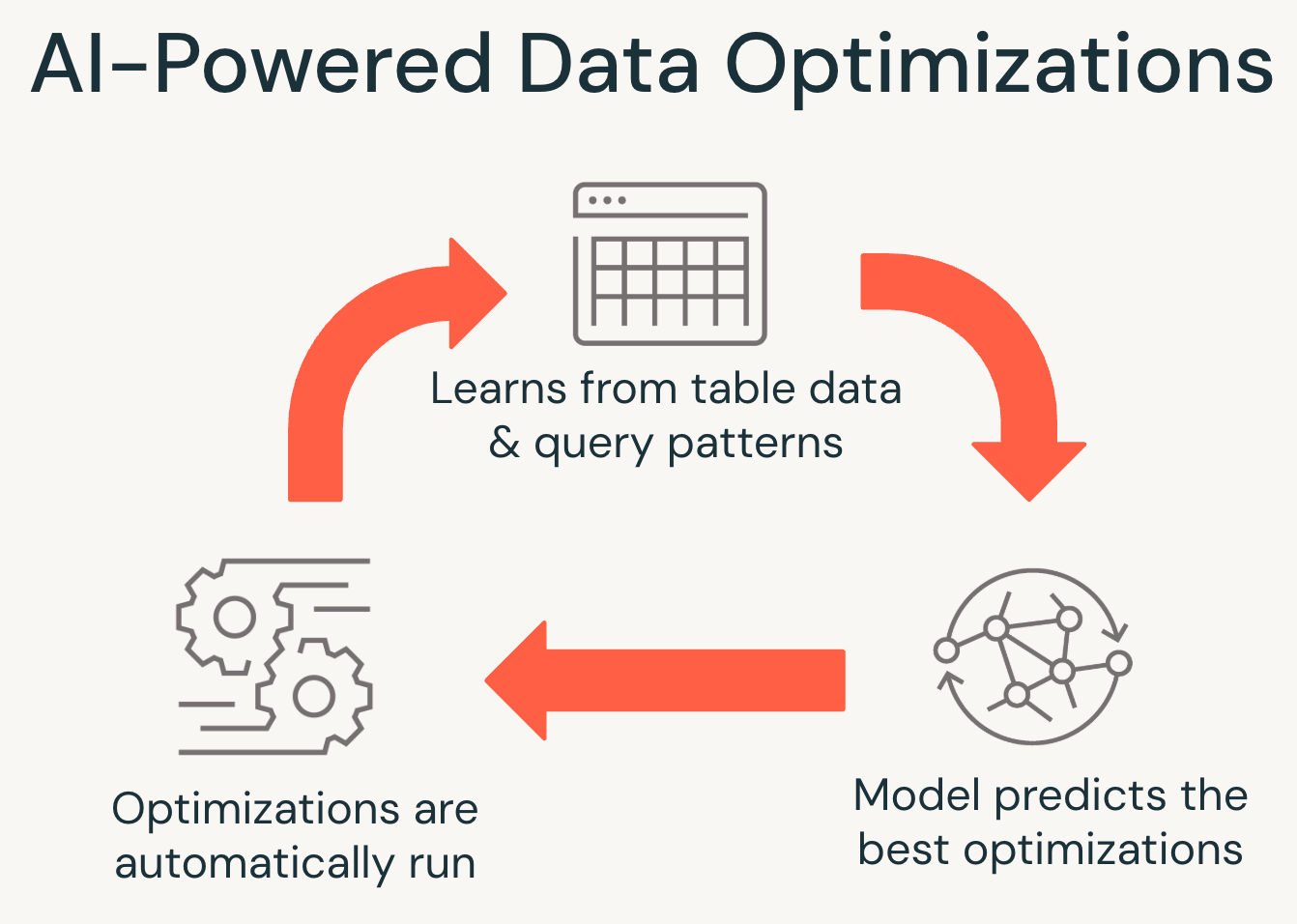
The construction of UC managed tables additionally allows superior AI capabilities that weren’t potential earlier than. Since all reads and writes route by Unity Catalog, Databricks can intelligently optimize knowledge primarily based on precise utilization, enhancing question efficiency, decreasing storage prices, and eliminating routine upkeep.
Key advantages embrace:
- Computerized upgrades with the most recent options
- Self-maintenance with compaction, clustering, and vacuuming
- Storage and compute value financial savings by clever optimization
- Safe entry by way of Open APIs, even for non-Databricks shoppers
- Quicker queries throughout all shoppers, not simply in Databricks
On this weblog, we are going to present a deep dive into options that make UC managed tables efficient, together with current enhancements and a preview of what’s on the roadmap.
“Unity Catalog managed tables’ automated optimizations saved us over $1 million yearly in storage prices whereas eliminating the necessity for tedious guide effort every day.” —Abhinav Raghuvanshi, Affiliate Director of Knowledge Engineering at Zepto
What are the advantages of Unity Catalog managed tables?
UC managed tables are optimized by default, with no guide tuning required. They repeatedly adapt primarily based on question workloads to enhance efficiency, scale back storage prices, and streamline lifecycle administration.
UC managed tables additionally simplify operations with built-in options like automated vacuuming, file compaction, and metadata caching. As a result of they’re constructed on open codecs like Delta and Iceberg, UC managed tables combine simply with third-party instruments and engines.
Clever Optimizations Drive Value and Efficiency Beneficial properties
UC managed tables apply a set of AI-driven strategies to ship as much as 50%+ value financial savings and 20x+ sooner queries:
Computerized Liquid Clustering
UC managed tables robotically cluster knowledge primarily based on noticed question patterns, with out requiring any guide configuration. In distinction, UC exterior tables require knowledge engineers to run OPTIMIZE instructions and manually outline clustering keys. With managed tables, Predictive Optimization handles clustering dynamically, enhancing question efficiency and decreasing storage prices with out further effort. [Read more]
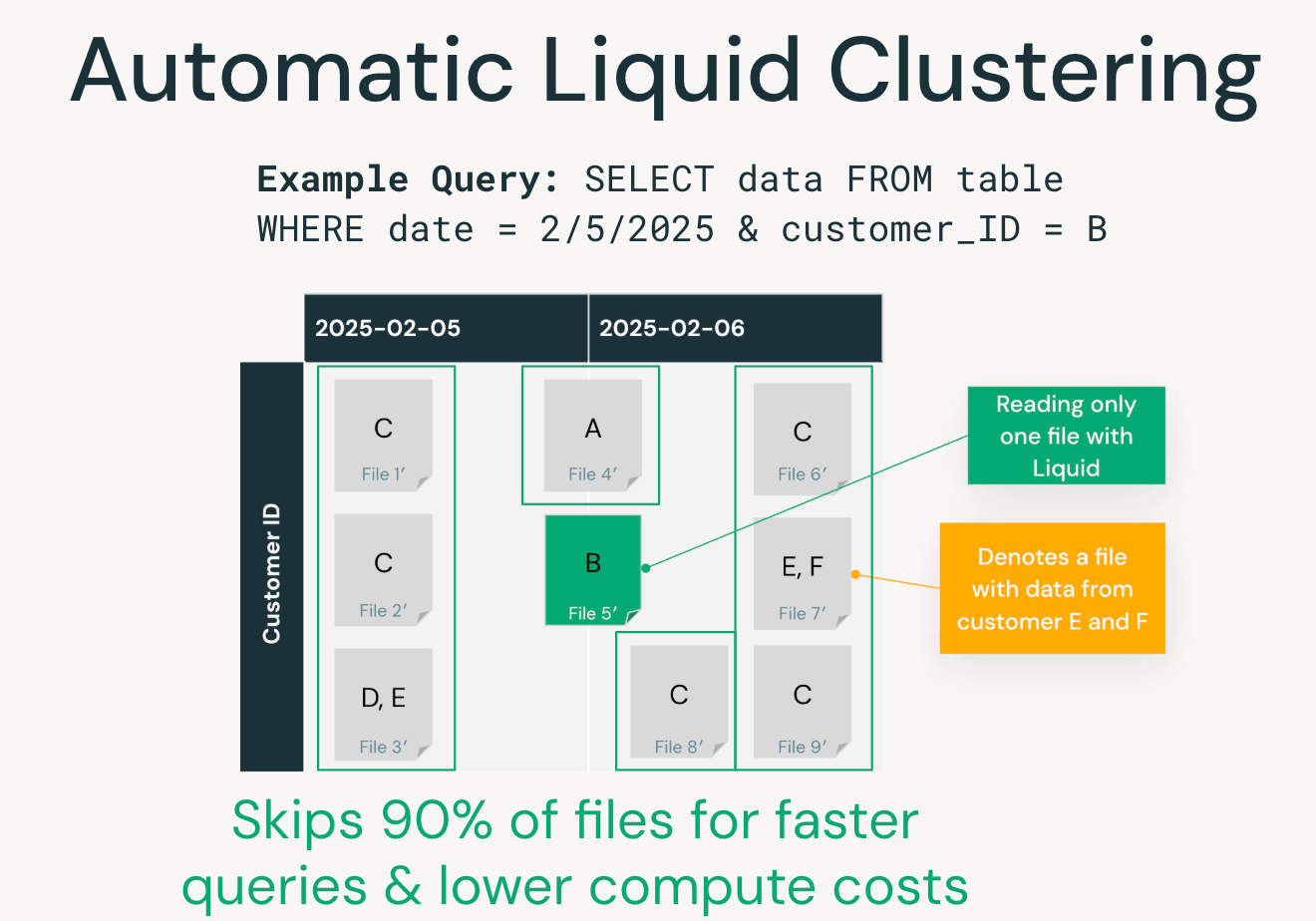
Computerized VACUUM
On UC managed tables, Predictive Optimization robotically identifies when a VACUUM operation is helpful and schedules it accordingly. VACUUM removes recordsdata related to deleted rows after an outlined retention interval, serving to scale back storage utilization. For UC-external tables, this course of should be managed manually by operating the VACUUM command.
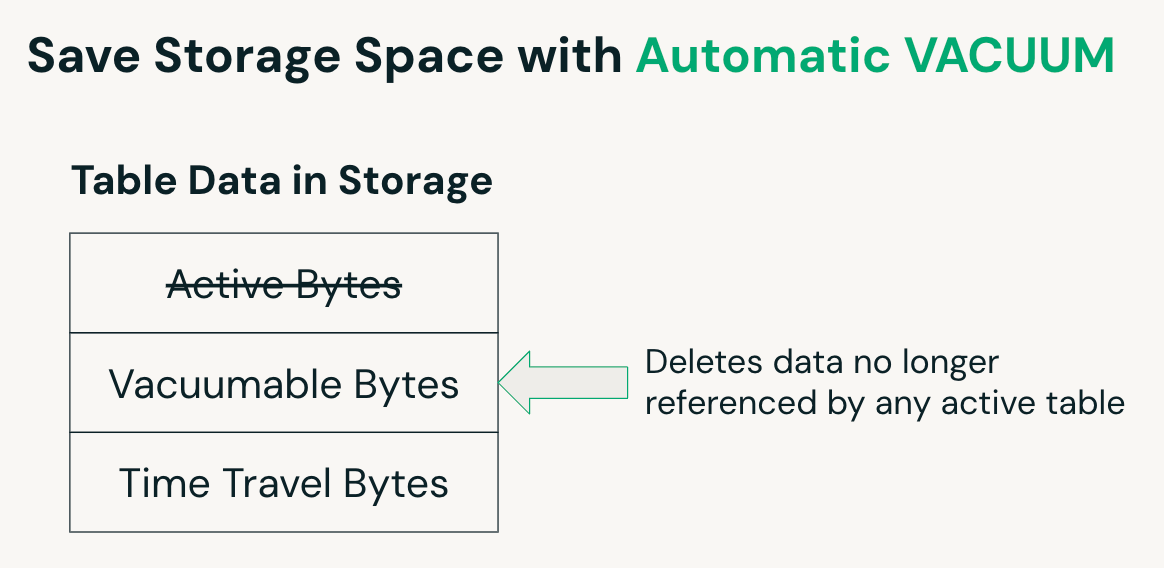
Deferred DROP with Auto Cleanup
When a UC managed desk is dropped, the underlying knowledge in cloud storage is robotically deleted after 7 days, serving to scale back storage prices and keep away from orphaned recordsdata. In distinction, dropping a UC exterior desk doesn’t delete the info; customers should manually take away the recordsdata from their storage bucket. If this step is missed, the info stays, resulting in pointless storage utilization. See the roadmap part for upcoming enhancements to this conduct.
Computerized Statistics Assortment
UC managed tables robotically acquire statistics that enhance question efficiency by smarter knowledge skipping and be a part of planning. Key metrics, reminiscent of minimal and most column values, assist the system establish and skip irrelevant recordsdata throughout question execution, decreasing compute overhead. Whereas UC exterior tables generate statistics on the primary 32 columns by default, UC managed tables dynamically prioritize the columns most related to precise question workloads. [Read more]
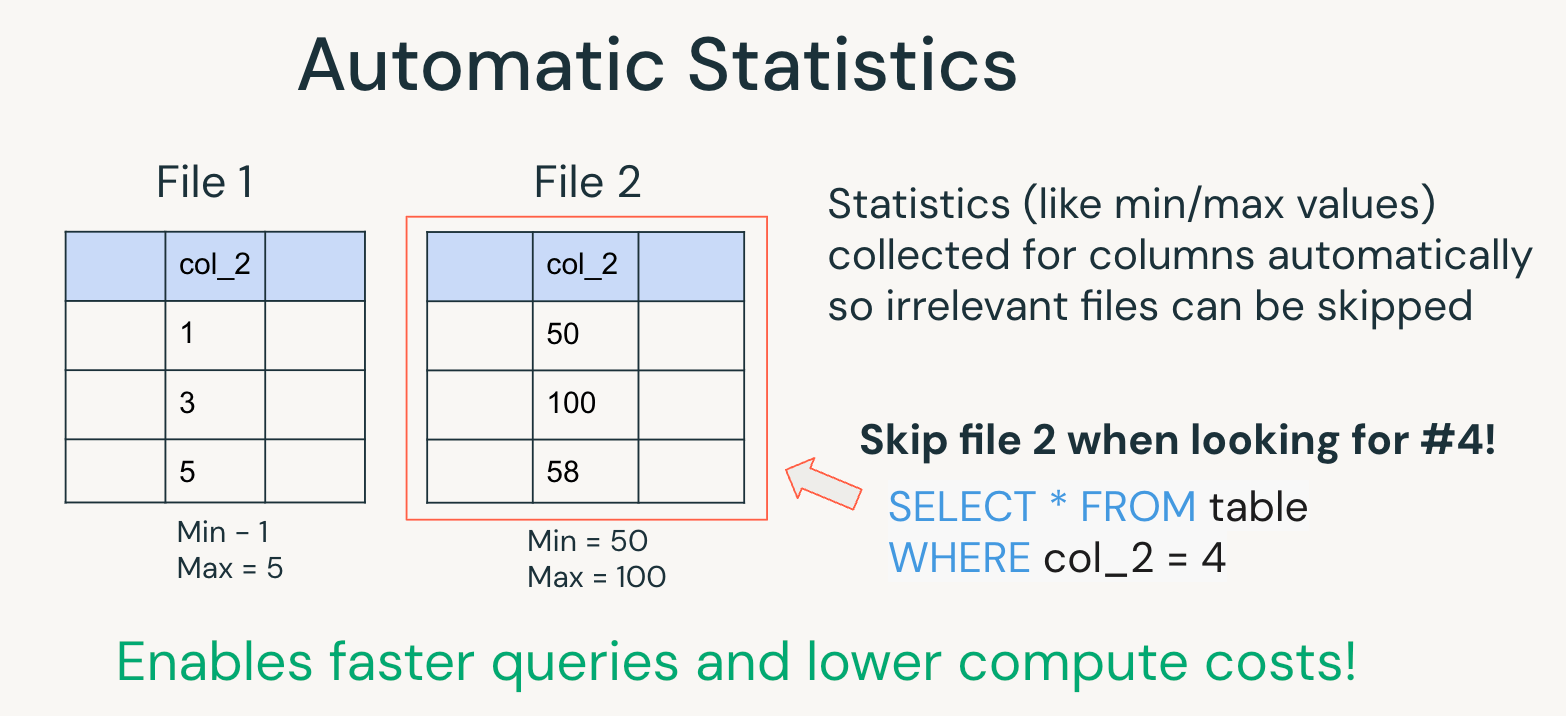
Metadata Caching
UC managed tables use in-memory caching of transaction metadata to cut back entry to cloud-based transaction logs. This lowers compute prices and improves question planning efficiency. The function is unique to UC managed tables, the place Databricks can observe all writes and make sure the cached metadata stays in step with the present state.
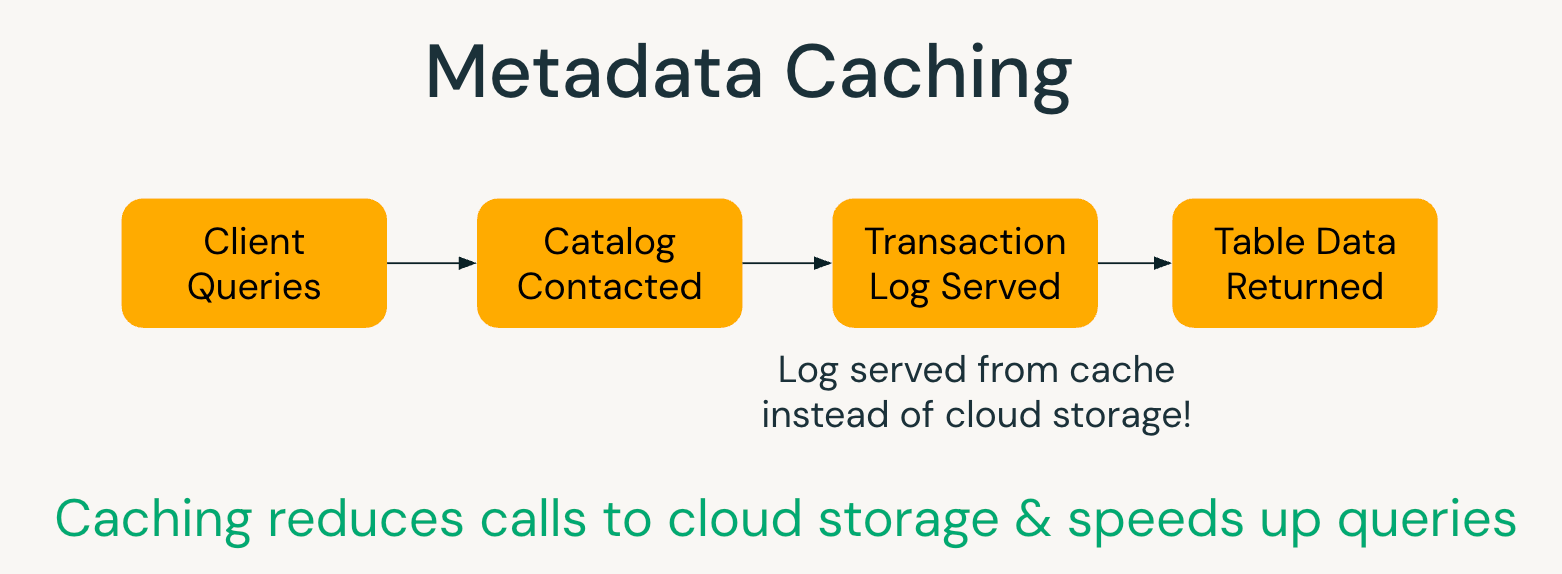
File Dimension Optimization
Databricks makes use of AI to robotically compact recordsdata to optimum sizes, primarily based on patterns discovered from hundreds of real-world deployments. This optimization happens as knowledge is written and helps enhance question efficiency by decreasing file fragmentation and scan overhead. [Read More]
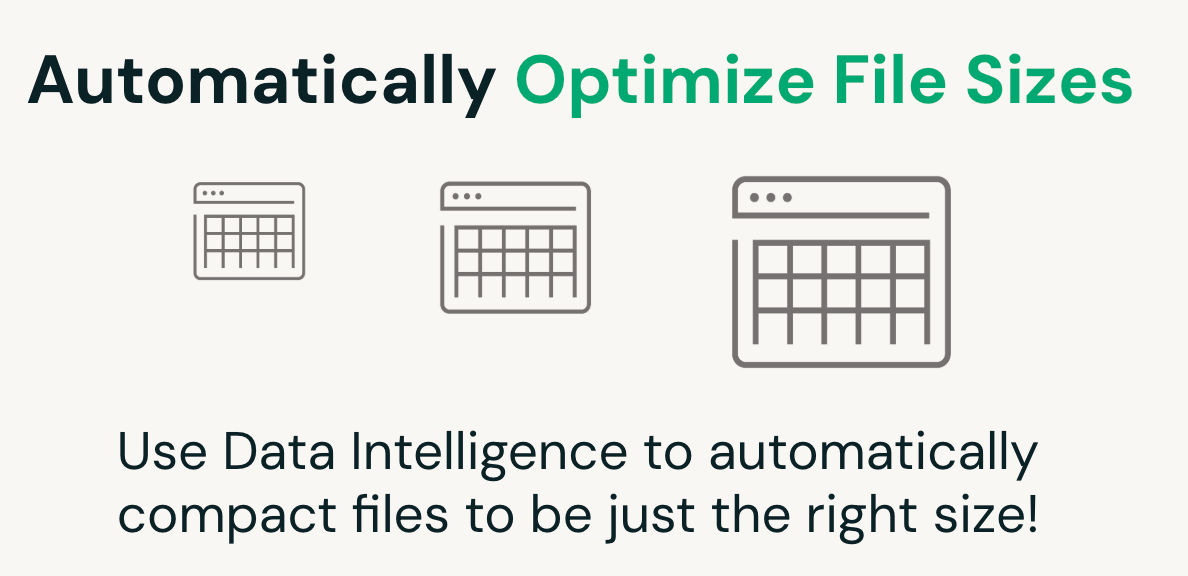
Open and Interoperable by Design
UC managed tables are constructed on open codecs like Delta and Iceberg, enabling broad compatibility throughout the fashionable knowledge ecosystem. They are often accessed by any engine that helps these codecs, together with Trino, DuckDB, Apache Spark™, Daft, and instruments built-in with the Iceberg REST catalog, reminiscent of Dremio.
Safe entry is made potential by Open APIs and credential merchandising, permitting exterior instruments to work together with ruled knowledge with out duplicating it. This simplifies structure and allows a single supply of fact throughout analytics and AI workloads.
Assist for third-party writes can also be increasing. In Personal Preview, UC managed tables now settle for writes from non-Databricks Delta shoppers—reminiscent of Apache Spark—making it simpler to combine with exterior processing frameworks whereas sustaining Unity Catalog governance.
Delta Sharing, the business’s solely open sharing protocol, additional enhances interoperability by permitting safe, read-only entry to underlying knowledge, even for recipients not utilizing Databricks. These capabilities assist prolong ruled knowledge entry throughout platforms, companions, and purposes.
As a result of these optimizations apply on the knowledge format degree, efficiency positive aspects are common. Exterior instruments profit from the identical clustered format, compacted recordsdata, and wealthy statistics, leading to sooner queries and extra environment friendly reads, regardless of the engine.
What’s on the Roadmap
A number of new options are coming quickly that may make UC managed tables much more highly effective and versatile:
Desk-Stage Observability
Achieve visibility into unused tables, retention home windows, desk measurement developments, and customized metadata, making it simpler to handle prices and implement finest practices.
Configurable UNDROP Intervals
Customise the retention window for dropped tables, together with help for instant deletion to cut back storage prices even additional.
Schema and Catalog Reorganization Instruments
Instructions to maneuver tables throughout catalogs and schemas, serving to groups maintain datasets logically organized as environments evolve.
Multi-Assertion and Multi-Desk Transactions (Personal Preview)
Assist for atomic commits throughout a number of tables. If any operation fails, your entire transaction rolls again, enhancing reliability for advanced knowledge operations.
Getting Began with UC managed tables
UC managed tables are enabled by default and simple to undertake, whether or not creating new tables or changing present ones.
Create a brand new managed desk
For brand new workloads, UC managed tables are created with no need to specify a storage location. Databricks robotically manages the info path in customer-owned cloud storage:
CREATE OR REPLACE TABLE catalog.schema.my_managed_table
Convert an present UC exterior desk to managed
Organizations seeking to convert to managed tables can use the next command to transform exterior UC tables:
ALTER TABLE catalog.schema.my_external_table SET MANAGED
View documentation and request entry to the gated public preview utilizing this kind.
Convert international tables (non-UC)
For groups migrating from international desk sorts, conversion to UC managed tables is obtainable in Personal Preview. This makes it simpler to consolidate governance and optimization below Unity Catalog. You possibly can request entry to the gated preview utilizing this kind.
Strive superior options in preview
To experiment with options like third-party writes to managed tables, multi-table transactions, or schema reorganization, contact your Databricks account group to hitch related preview packages.

